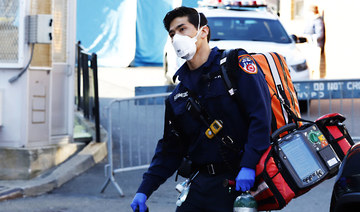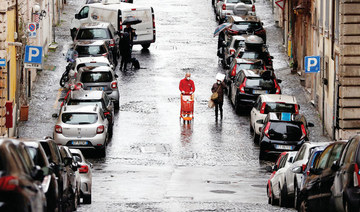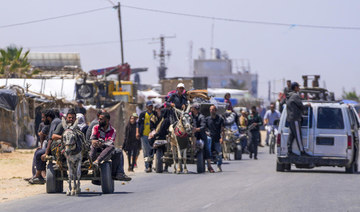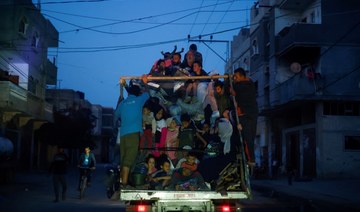ROME: Doctors and nurses in Italy’s overwhelmed northern hospitals have welcomed a slight stabilizing in the number of coronavirus infections but fear the virus is still silently spreading in the south two weeks into the West’s most extreme nationwide shutdown.
As the dead in Italy keep piling up, virologists warn that the actual number of Italy’s positive cases is up to five times as high as the official count of 80,539. That means infections will still climb even with Italians ordered to stay home for all but essential activity.
Italy, the epicenter of Europe’s pandemic, has by far the most virus deaths of any nation in the world, a grim tally of 8,165. On Friday, Italy is on track to surpass China in its infection count and have the most cases of any nation behind the US
‘’It is something devastating,’’ said the Rev. Mario Carminati, who has turned over a church in the tiny Lombard town of Seriate to host coffins before they are taken by military convoy to be cremated. This week, dozens were lined up in two neat rows down the central aisle, and were immediately replaced by new ones when they were taken away.
“At least the relatives and family know that someone is taking care of them, with a prayer and a benediction before they are taken away,’’ he said.
Despite the toll, officials have also expressed cautious optimism that the exponential spread of the virus is starting to slow in the hard-hit north, thanks to two weeks of military-enforced stay-at-home orders. For several days this week, new infections and deaths showed signs of slowing down, and emergency rooms weren’t seeing the tsunami of sick that characterized the first weeks of the pandemic following Italy’s first positive test Feb. 20.
“The numbers are still high, but for a few days now the numbers have stopped rising, thank God,” said Dr. Luca Lorini, head of intensive care at the Pope John XXIII hospital in Bergamo, one of the hardest hit of Italy’s public hospitals.
Some 500 medical personnel at the hospital are infected, and Lorini said he has found himself treating colleagues, friends, children of friends and parents of friends in his overwhelmed 88-bed ICU that serves a city of 120,000.
He marvels that he is still standing and wonders if maybe he was infected early on with slight symptoms and developed immunity. Nationwide, at least 33 doctors have died and 6,414 medical personnel have tested positive
“We know it before we go into battle, and we accept it,” Lorini told The Associated Press.
Elsewhere in Bergamo, the Italian army’s Alpini mountaineering forces are building a field hospital to be staffed, in part, by some of the 150 medical personnel sent by Russia, one of only a handful of countries along with China and Cuba to respond to Italy’s urgent appeal for medical equipment, protective masks and personnel.
But the need is also growing in the south, where hospitals are even less prepared and equipped than the prosperous north.
“It’s a matter of hours, not days,” the governor of the Campania region that includes Naples wrote to the central government, complaining that his urgent requests for ventilators had gone unheeded. “There is a real chance of adding a tragedy of the south to the tragedy of the north.”
Cateno De Luca, mayor of the Sicilian city of Messina, took the extraordinary step of recording a warning to residents in his nasal, gravely voice for drones to play as they fly over the seaside city monitoring residents’ movements.
“Don’t go outside! That is an order from Mayor De Luca!” the drone blasts.
Italy’s high death toll and aggressive spread of the virus has led Italian epidemiologists to estimate that the true number of infected could be as high as 450,000, and that under-testing is putting Italians at risk of further contagion. Currently, Italy only tests people showing symptoms, because its labs cannot process any more, and to date more than 360,000 tests have been performed.
Virologist Dr. Andrea Crisanti, director of molecular medicine at the University of Padua and a consultant for the Veneto regional government, points to the only controlled epidemiological study done in the outbreak, in the tiny Veneto town of Vo’Euganeo, as evidence that Italy’s true numbers of infection are much higher — and that the risk of not testing more widely is enormous.
Italy recorded its first death in Vo, and the town was locked down Feb. 22 and the entire population of 3,300 tested. According to the study, 3% of Vo’s residents were infected, but between 50%-75% of them were asymptomatic. But because all positive cases were identified, isolated and quarantined, regardless of whether they were symptomatic, Vo has seen its new infections crumble.
“This tiny town has taught us a lot,” Crisanti told state-run RAI radio.
Crisanti said the Vo study showed that even asymptomatic people transmit the virus, since the few new infections registered between tests were within households of asymptomatic people. The only way to stop the spread, he told RAI, is more testing, active surveillance of all positive cases and quarantine.
Based on the Vo results, Veneto Gov. Luca Zaia is planning to vastly ramp up testing across the region, aiming to reach 20,000 tests a day and hand out protective masks to each family. Already, Veneto has tested nearly 80,000 people, and compared to hard-hit Lombardy next door, has a comparatively low mortality rate with 287 dead and 6,935 positive cases.
The government on March 10 imposed a nationwide lockdown after an initial quarantine of a dozen small towns in Lombardy and Veneto failed to stop the spread of the virus. On Thursday, Italy idled all non-essential production and industry, the most widespread manufacturing shutdown in the world.
The industrial lobby Confindustria has estimated it could cost 70 billion-to-100 billion euros ($77 billion-$110 billion) of national wealth a month if 70% of companies are closed.
Two weeks in, the measures appear to be having their effect on the virus, slowing new infections and relieving pressure on the health system. By Thursday, more than 10,000 of Italy’s 80,000 infected had been cured.
Twenty days after coming down with a fever, and after nearly a week in an air-pressurized helmet pumping oxygen into his virus-ravaged lungs, Fausto Russo is now breathing on his own and hopes to go home as early as Sunday from the Santa Maria Goretti hospital in Latina, near Rome.
“It’s a horrible sensation, not being able to breathe,” said Russo, a 38-year-old fitness trainer. “Imagine putting your head under water.”
Lorini, the doctor, knows well the toll that the virus takes on both patients and hospital staff. When he goes home each night, a five-minute walk from the hospital, he allows himself a few minutes to listen to music and “unplug” from the intensity of the ICU ward.
His current favorite song is Bruce Springstein’s “Secret Garden.” He smiles as he thinks about the lyrics. “You’ve gone a million miles/ How far’d you get/ To that place where/ You can’t remember/ And you can’t forget.”
“Listen to it today,” Lorini suggested. “It will give you a sense of tenderness.”
Italy hopes virus is easing but fears new onslaught in south
https://arab.news/j4gjx
Italy hopes virus is easing but fears new onslaught in south
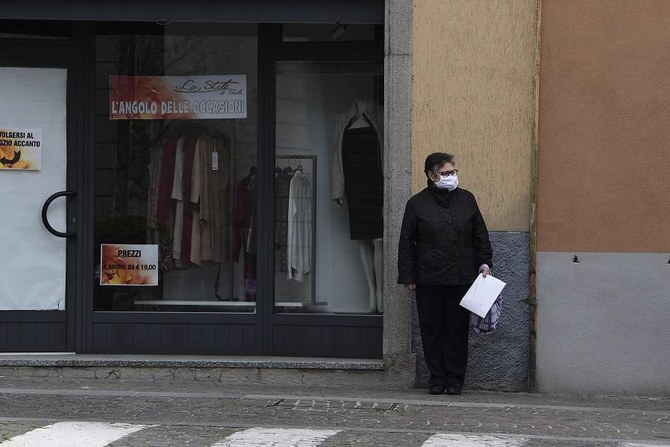
- Italy, the epicenter of Europe’s pandemic, has by far the most virus deaths of any nation in the world, a grim tally of 8,165
- Despite the toll, officials have also expressed cautious optimism that the exponential spread of the virus is starting to slow in the hard-hit north
Philippines invites Saudi partnerships in halal industry, renewables
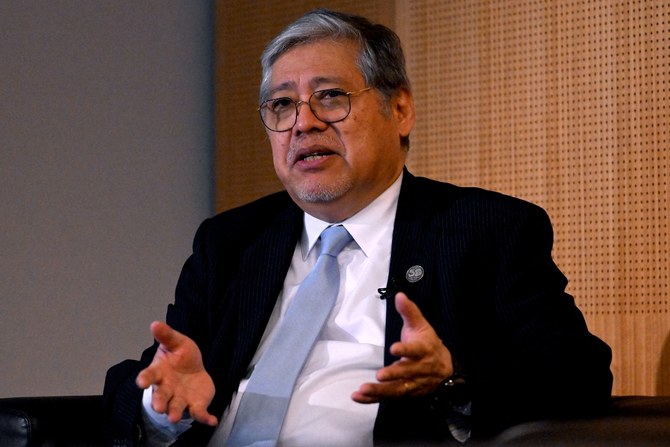
- Govt wants renewables to contribute 35% to energy mix by 2030
- It launched strategic plan to develop domestic halal industry in January
MANILA: The Philippines says it is open to expanding partnerships with Saudi Arabia in its top priority sectors, including renewable energy and the halal industry.
The use of renewable energy was announced as the main issue in the country’s climate agenda during President Ferdinand Marcos Jr.’s first state of the nation address in 2022.
Renewable energy contributes about 30 percent to the Philippines’ energy mix, which is dominated by coal and oil. The government seeks to increase it to 35 percent by 2030 and 50 percent by 2040, and make renewables more accessible to the public.
“Given the Kingdom’s role in the supply of conventional and renewable energy, the Philippines is open to possible partnerships in the field of renewables,” Foreign Affairs Secretary Enrique Manalo told Arab News this week.
An agreement to enhance cooperation in the field was reached in October, during President Ferdinand Marcos’ visit to the Kingdom at the invitation of Saudi Crown Mohammed bin Salman.
A business delegation accompanying the president signed investment agreements collectively worth more than $4.26 billion with Saudi business leaders.
“With Saudi Arabia’s role as a regional business and political hub, we wish to increase investments,” Manalo said.
“Further, amidst the region’s changing landscape and economic diversification initiatives, we aspire to expand our partnership in the fields of agriculture, tourism and the halal industry.”
In January, the predominantly Catholic Philippines — where Muslims constitute about 10 percent of the almost 120 million population — launched its Halal Industry Development Strategic Plan to tap into the global halal market, which is estimated to be worth more than $7 trillion.
The plan aims to double the industry’s output in the next four years, create 120,000 new jobs and attract $4 billion in investments by 2028.
Greece to bring in Egyptian farm workers amid labor shortage
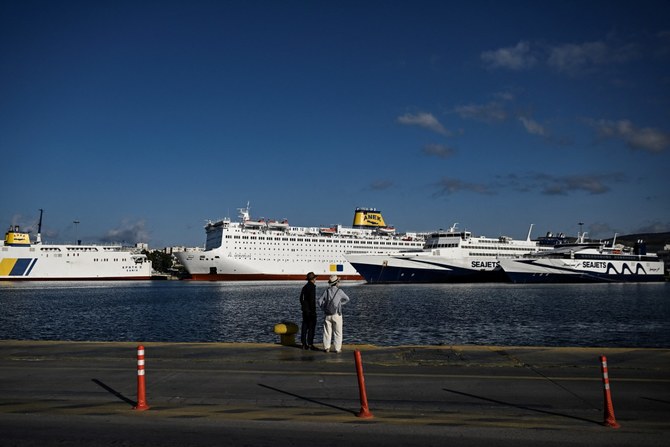
- Greece will take in around 5,000 seasonal farm workers under the 2022 deal signed with Egypt
ATHENS: Greece will start bringing in workers from Egypt this summer to take on temporary farming jobs under a deal between the countries to tackle a labor shortage, the migration ministry said on Friday.
After a decade of pain, the Greek economy is forecast to grow nearly 3 percent this year, far outpacing the euro zone average of 0.8 percent.
But an exodus of workers during Greece’s economic crisis, a shrinking population and strict migration rules have left the country struggling to find tens of thousands of workers to fill vacancies in farming, tourism, construction and other sectors.
Greece will take in around 5,000 seasonal farm workers under the 2022 deal signed with Egypt.
The countries have discussed expanding the “mutually beneficial” scheme to the Greek construction and tourism sectors, the Greek Migration Ministry said in a statement.
Migration has long been a divisive issue in Europe, but the plan had won broad support from employers groups keen to find workers.
Greek Migration Minister Dimitris Kairidis met Egyptian Labour Minister Hassan Shehata in Cairo this week and said the countries should also step up cooperation to fend off illegal migration flows in the region.
Egyptian officials have said their country deserves recognition for largely stopping migrants setting off from its northern coast across the Mediterranean to Europe since 2016.
The European Union this year announced a multi-billion euro funding package and an upgraded relationship with Egypt, part of a push to cut down on the number of migrants crossing over from North Africa.
Rights groups have criticized Western support for Egyptian President Abdel Fattah El-Sisi, who came to power a decade ago after leading the overthrow of Egypt’s first democratically elected leader.
India says Canada has shared no evidence of its involvement in killing of Sikh separatist leader
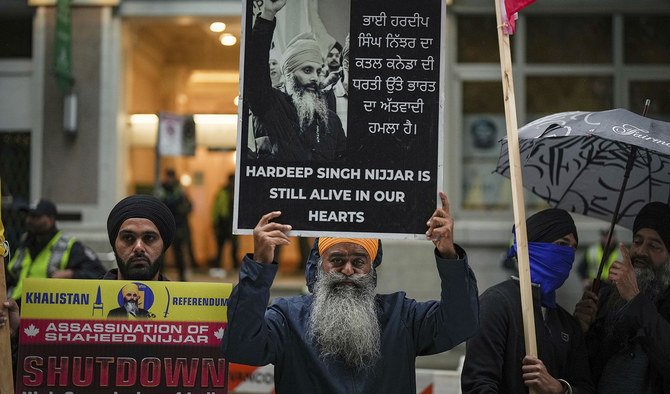
- Three Indian nationals who had been temporarily living in Canada were arrested on Tuesday in the June slaying of Hardeep Singh Nijjar
- PM Trudeau set off a diplomatic spat with India in Sept. when he cited ‘credible allegations’ of India’s involvement in the Sikh’s murder
NEW DELHI: India said Thursday that Canada has shared no evidence to back its allegation that the Indian government was involved in the slaying of a Sikh separatist leader in Canada last year, despite the recent arrests of three Indian men in the crime.
India’s External Affairs Ministry spokesman Randhir Jaiswal also reiterated India’s longstanding allegation that Canada harbors Indian extremists.
Three Indian nationals who had been living in Canada temporarily were arrested on Tuesday in the slaying last June of Hardeep Singh Nijjar in British Columbia. Canadian Prime Minister Justin Trudeau had set off a diplomatic spat with India last September when he cited “credible allegations” of India’s involvement in the slaying of the Sikh separatist. India rejected the accusations.
Canadian Mounted Police Superintendent Mandeep Mooker said after the men’s arrests that the investigation into whether they had ties to India’s government was ongoing.
Jaiswal said the two governments are discussing the case but that Canada has forwarded no specific evidence of the Indian government’s involvement.
Meanwhile, Jaiswal said New Delhi has complained to Canadian authorities that separatists, extremists and those advocating violence against India have been allowed entry and residency in Canada. “Many of our extradition requests are pending,” he said.
“Our diplomats have been threatened with impunity and obstructed in their performance of duties,” Jaiswal added. “We are having discussions at the diplomatic level on all these matters,” he said.
The three Indian men arrested in Canada haven’t yet sought any access to the Indian diplomats there, Jaiswal said.
The three — Kamalpreet Singh, 22, Karan Brar, 22, and Karanpreet Singh, 28 — appeared in court Tuesday via a video link and agreed to a trial in English. They were ordered to appear in British Columbia Provincial Court again on May 21.
They were arrested last week in Edmonton, Alberta. They have been charged with first-degree murder and conspiracy to commit murder.
Spain, Ireland to recognize Palestinian state on May 21 — EU’s Borrell
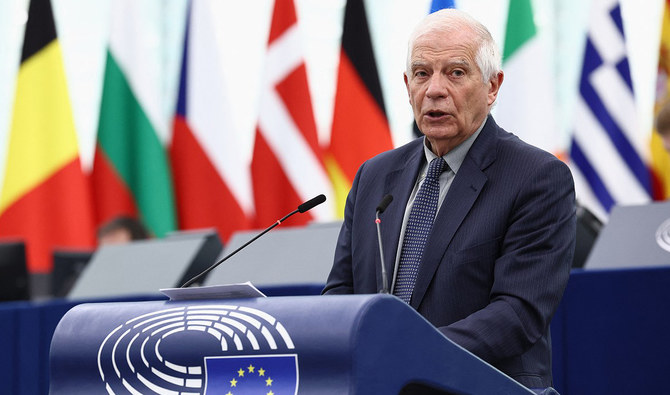
- Calls for end to Palestinian-Israeli conflict have grown along with the death toll from Israel’s war on Gaza
- Spain, others agreed to recognition of Palestinian state, seeing a two-state solution as essential for peace
MADRID: Spain, Ireland and other European Union member countries plan to recognize a Palestinian state on May 21, the EU’s foreign policy chief, Josep Borrell, said late on Thursday ahead of an expected UN vote on Friday on a Palestinian bid to become a full member.
Spanish Prime Minister Pedro Sanchez said in March that Spain and Ireland, along with Slovenia and Malta, had agreed to take the first steps toward recognition of a Palestinian state alongside Israel, seeing a two-state solution as essential for lasting peace.
Asked on local Spanish radio station RNE if May 21 was when Spain, Ireland and other EU countries would recognize a Palestinian state, Borrell said yes, mentioning Slovenia as well.
“This is a symbolic act of a political nature. More than a state, it recognizes the will for that state to exist,” he said, adding that Belgium and other countries would probably follow.
Previously, Spanish Foreign Minister Jose Manuel Albares had said the decision on recognition had been made, although he did not give a date.
International calls for a ceasefire and permanent end to Palestinian-Israeli conflict have grown along with the death toll from Israel’s offensive in Gaza to rout out Hamas after the militants’ deadly cross-border attack on Oct. 7.
Israel has said plans for Palestinian recognition constitute a “prize for terrorism” that would reduce the chances of a negotiated resolution to the Gaza conflict.
On Friday the United Nations General Assembly is set to back a Palestinian bid to become a full UN member by recognizing it as qualified to join and sending the application back to the UN Security Council to “reconsider the matter favorably.”
Ireland’s national broadcaster RTE said on Thursday that Spain, Ireland, Slovenia and Malta had been waiting for the UN vote and were considering a joint recognition on May 21.
A spokesperson for the Spanish Foreign Ministry did not immediately respond to a request for comment. There was no immediate comment on the date from the other countries.
Slovenian Prime Minister Robert Golob said earlier this week his country would recognize Palestine’s statehood by mid June.
Since 1988, 139 out of 193 UN member states have recognized Palestinian statehood.
Spain, Ireland to recognize Palestinian state on May 21 — EU’s Borrell
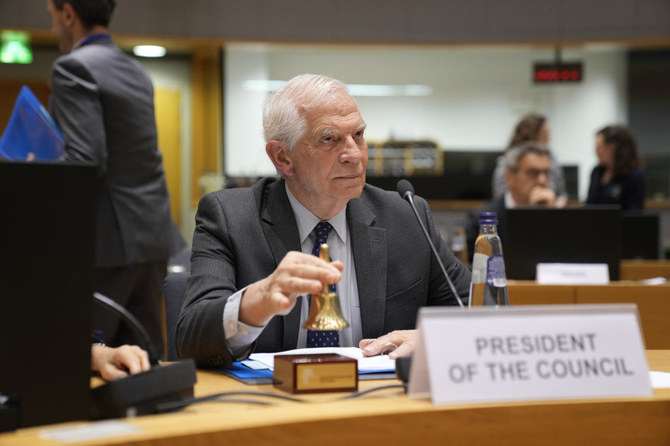
- Spain and Ireland, along with Slovenia and Malta, had agreed to take the first steps toward recognition of a Palestinian state alongside Israel
MADRID: Spain, Ireland and other European Union member countries plan to recognize a Palestinian state on May 21, the EU’s foreign policy chief, Josep Borrell, said late on Thursday ahead of an expected UN vote on Friday on a Palestinian bid to become a full member.
Spanish Prime Minister Pedro Sanchez said in March that Spain and Ireland, along with Slovenia and Malta, had agreed to take the first steps toward recognition of a Palestinian state alongside Israel, seeing a two-state solution as essential for lasting peace.
Asked on local Spanish radio station RNE if May 21 was when Spain, Ireland and other EU countries would recognize a Palestinian state, Borrell said yes, mentioning Slovenia as well.
“This is a symbolic act of a political nature. More than a state, it recognizes the will for that state to exist,” he said, adding that Belgium and other countries would probably follow.
Previously, Spanish Foreign Minister Jose Manuel Albares had said the decision on recognition had been made, although he did not give a date.
International calls for a ceasefire and permanent end to Palestinian-Israeli conflict have grown along with the death toll from Israel’s offensive in Gaza to rout out Hamas after the militants’ deadly cross-border attack on Oct. 7.
Israel has said plans for Palestinian recognition constitute a “prize for terrorism” that would reduce the chances of a negotiated resolution to the Gaza conflict.
On Friday the United Nations General Assembly is set to back a Palestinian bid to become a full UN member by recognizing it as qualified to join and sending the application back to the UN Security Council to “reconsider the matter favorably.”
Ireland’s national broadcaster RTE said on Thursday that Spain, Ireland, Slovenia and Malta had been waiting for the UN vote and were considering a joint recognition on May 21.
A spokesperson for the Spanish Foreign Ministry did not immediately respond to a request for comment. There was no immediate comment on the date from the other countries.
Slovenian Prime Minister Robert Golob said earlier this week his country would recognize Palestine’s statehood by mid June.
Since 1988, 139 out of 193 UN member states have recognized Palestinian statehood.



